There a different types of FFL to choose from. Make sure you understand which FFL type is best for you.
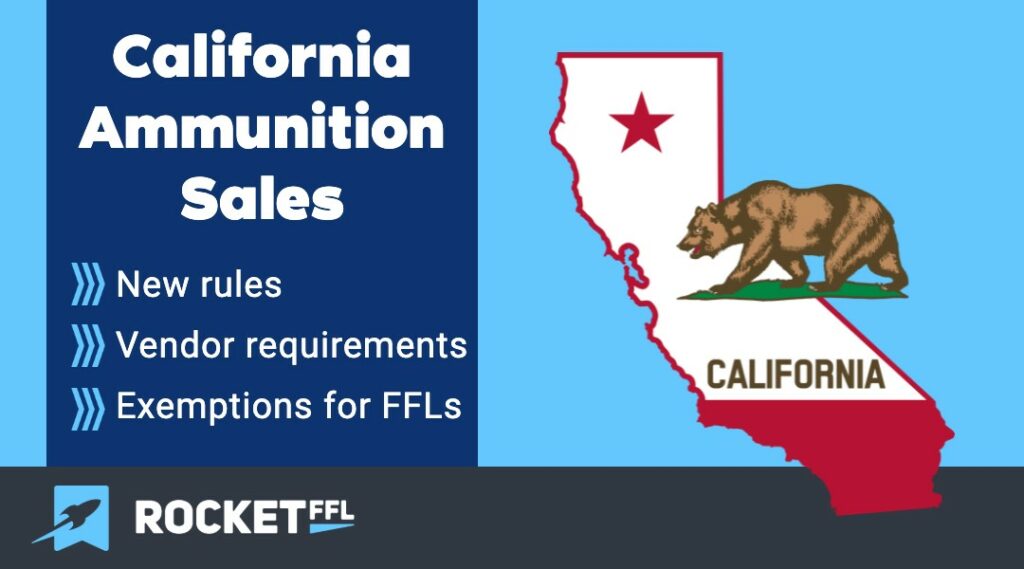
California Ammunition Law 2018 Explained
IMPORTANT NOTICE ABOUT AMMUNITION VENDOR LICENSES<\/h3>\r\n \r\n\r\nBeginning January 1, 2018, a valid ammunition vendor license is required for any person, firm, corporation, or other business enterprise to sell more than 500 rounds of ammunition in any 30-day period. (See California Penal Code section 30342.) The Department of Justice is authorized to issue the license, which is valid for a period of one year. Providing the requirements are met, a licensed firearm dealer is automatically deemed a licensed ammunition vendor. All other vendors must apply for, and receive, the annual license before selling ammunition. If an application is denied, the Department will inform the applicant of the reason for the denial in writing. (See California Penal Code section 30385.)\r\n\r\n \r\n\r\nIn accordance with these provisions, the Department has received and processed more than 225 applications for ammunition vendor licenses since July 2017. The Department expects to issue a license electronically, upon approval of its regulations.\r\n\r\n“, “_text_content”: “field_6071c2a25b20f”, “author”: “”, “_author”: “field_6071c2a25b200” }, “align”: false, “mode”: “edit” } /–>
\r\n
IMPORTANT NOTICE ABOUT AMMUNITION VENDOR LICENSES<\/h3>\r\n
\r\n\r\nBeginning January 1, 2018, a valid ammunition vendor license is required for any person, firm, corporation, or other business enterprise to sell more than 500 rounds of ammunition in any 30-day period. (See California Penal Code section 30342.) The Department of Justice is authorized to issue the license, which is valid for a period of one year. Providing the requirements are met, a licensed firearm dealer is automatically deemed a licensed ammunition vendor. All other vendors must apply for, and receive, the annual license before selling ammunition. If an application is denied, the Department will inform the applicant of the reason for the denial in writing. (See California Penal Code section 30385.)\r\n\r\n \r\n\r\nIn accordance with these provisions, the Department has received and processed more than 225 applications for ammunition vendor licenses since July 2017. The Department expects to issue a license electronically, upon approval of its regulations.\r\n\r\n“, “_text_content”: “field_6071c2a25b20f”, “author”: “”, “_author”: “field_6071c2a25b200” }, “align”: false, “mode”: “edit” } /–>
\r\nIMPORTANT NOTICE ABOUT AMMUNITION VENDOR LICENSES<\/h3>\r\n \r\n\r\nBeginning January 1, 2018, a valid ammunition vendor license is required for any person, firm, corporation, or other business enterprise to sell more than 500 rounds of ammunition in any 30-day period. (See California Penal Code section 30342.) The Department of Justice is authorized to issue the license, which is valid for a period of one year. Providing the requirements are met, a licensed firearm dealer is automatically deemed a licensed ammunition vendor. All other vendors must apply for, and receive, the annual license before selling ammunition. If an application is denied, the Department will inform the applicant of the reason for the denial in writing. (See California Penal Code section 30385.)\r\n\r\n \r\n\r\nIn accordance with these provisions, the Department has received and processed more than 225 applications for ammunition vendor licenses since July 2017. The Department expects to issue a license electronically, upon approval of its regulations.\r\n\r\n“,
“_text_content”: “field_6071c2a25b20f”,
“author”: “”,
“_author”: “field_6071c2a25b200”
},
“align”: false,
“mode”: “edit”
} /–>
Q: What are the new California ammunition laws?
A: Beginning January 1, 2018, all ammunition sales must occur in face-to-face transactions (no online ammunition sales in California) and the seller needs a valid Ammunition Vendor License in order to sell more than 500 rounds of ammunition in any 30-day period.
Ammunition in California
California has recently enacted new laws regarding ammunition sales due to the passing of their Proposition 63. There are two major changes to the way ammunition is treated in California:
- Ammunition sales in California must occur in face-to-face transactions, and
- Certain sellers of ammunition in California need an Ammunition Vendor License.
This is obviously bad for gun rights and our industry.
There’s no more online ammunition sales in California, and now certain California ammunition sellers (that sell more than 500 rounds a month) need to apply for an additional license!
To make matters even worse, California is already having problems figuring out how to accept and process applications and issue California ammunition vendor permits.
However, if you’re already a Gun Dealer in California (or you’ve been thinking about becoming one by becoming an FFL) there’s a bit of good news:
California Licensed Firearm Dealers (FFLs) are automatically considered Licensed Ammunition Vendors!
Licensed Ammunition Vendor
Due to Prop 63, if you’d like to sell over 500 rounds of ammunition a month in California, you’ve got two options:
- Apply for a California Ammunition Vendor License, or
- Get your FFL and become a California Gun Dealer
Ok, we’re a bit biased, but we think that the best option is to get an FFL!
As mentioned above, gun dealers in California are automatically deemed California Ammunition Vendors. This means you can sell ammunition in California AND you can purchase guns at a discount, have them delivered right to you, and make money selling guns.
To be clear, there are a few states that require that you jump through some extra hoops to be a gun dealer – California is one of them! In our Get Your FFL guide, we detail the extra steps necessary to be a gun dealer in California.
Processing Ammunition Sales in California
As is all too common for the absolutely broken (inept) California government/bureaucracy, the state hasn’t even figured out/made it clear how to process ammunition transactions! We’ll update this page with more info as we have it.
01/01/2018: It is unclear what paperwork (if any) a licensed ammunition vendor or FFL must complete for sales, what the fee (if any) might be, how (if) to charge tax on 3rd party transfers, etc. All we know at this point is that an ammunition vendors license is needed in California (unless you’re an FFL). Also, for those that have applied for licenses, they haven’t been issued yet.
05/01/2020: U.S. District Judge Roger T. Benitez issued a preliminary injunction, which overturned California’s ammunition sales laws requiring face-to-face sales through licensed dealers, and background checks for ammunition buyers.
From the California Bureau of Firearms:
\r\n\r\nBeginning January 1, 2018, a valid ammunition vendor license is required for any person, firm, corporation, or other business enterprise to sell more than 500 rounds of ammunition in any 30-day period. (See California Penal Code section 30342.) The Department of Justice is authorized to issue the license, which is valid for a period of one year. Providing the requirements are met, a licensed firearm dealer is automatically deemed a licensed ammunition vendor. All other vendors must apply for, and receive, the annual license before selling ammunition. If an application is denied, the Department will inform the applicant of the reason for the denial in writing. (See California Penal Code section 30385.)\r\n\r\n
\r\n\r\nIn accordance with these provisions, the Department has received and processed more than 225 applications for ammunition vendor licenses since July 2017. The Department expects to issue a license electronically, upon approval of its regulations.\r\n\r\n“, “_text_content”: “field_6071c2a25b20f”, “author”: “”, “_author”: “field_6071c2a25b200” }, “align”: false, “mode”: “edit” } /–>
\r\n
IMPORTANT NOTICE ABOUT AMMUNITION VENDOR LICENSES<\/h3>\r\n
\r\n\r\nBeginning January 1, 2018, a valid ammunition vendor license is required for any person, firm, corporation, or other business enterprise to sell more than 500 rounds of ammunition in any 30-day period. (See California Penal Code section 30342.) The Department of Justice is authorized to issue the license, which is valid for a period of one year. Providing the requirements are met, a licensed firearm dealer is automatically deemed a licensed ammunition vendor. All other vendors must apply for, and receive, the annual license before selling ammunition. If an application is denied, the Department will inform the applicant of the reason for the denial in writing. (See California Penal Code section 30385.)\r\n\r\n \r\n\r\nIn accordance with these provisions, the Department has received and processed more than 225 applications for ammunition vendor licenses since July 2017. The Department expects to issue a license electronically, upon approval of its regulations.\r\n\r\n“, “_text_content”: “field_6071c2a25b20f”, “author”: “”, “_author”: “field_6071c2a25b200” }, “align”: false, “mode”: “edit” } /–>
\r\nIMPORTANT NOTICE ABOUT AMMUNITION VENDOR LICENSES<\/h3>\r\n \r\n\r\nBeginning January 1, 2018, a valid ammunition vendor license is required for any person, firm, corporation, or other business enterprise to sell more than 500 rounds of ammunition in any 30-day period. (See California Penal Code section 30342.) The Department of Justice is authorized to issue the license, which is valid for a period of one year. Providing the requirements are met, a licensed firearm dealer is automatically deemed a licensed ammunition vendor. All other vendors must apply for, and receive, the annual license before selling ammunition. If an application is denied, the Department will inform the applicant of the reason for the denial in writing. (See California Penal Code section 30385.)\r\n\r\n \r\n\r\nIn accordance with these provisions, the Department has received and processed more than 225 applications for ammunition vendor licenses since July 2017. The Department expects to issue a license electronically, upon approval of its regulations.\r\n\r\n“, “_text_content”: “field_6071c2a25b20f”, “author”: “”, “_author”: “field_6071c2a25b200” }, “align”: false, “mode”: “edit” } /–>
Recommended Posts

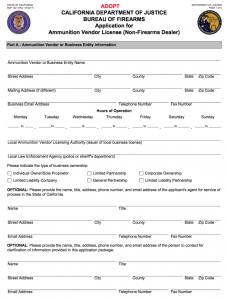
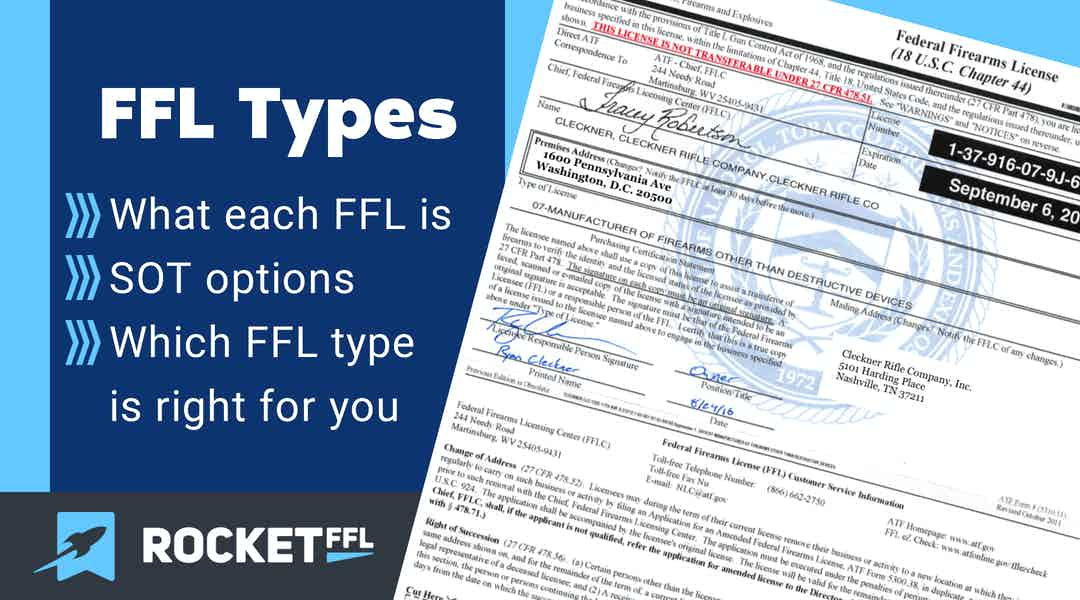
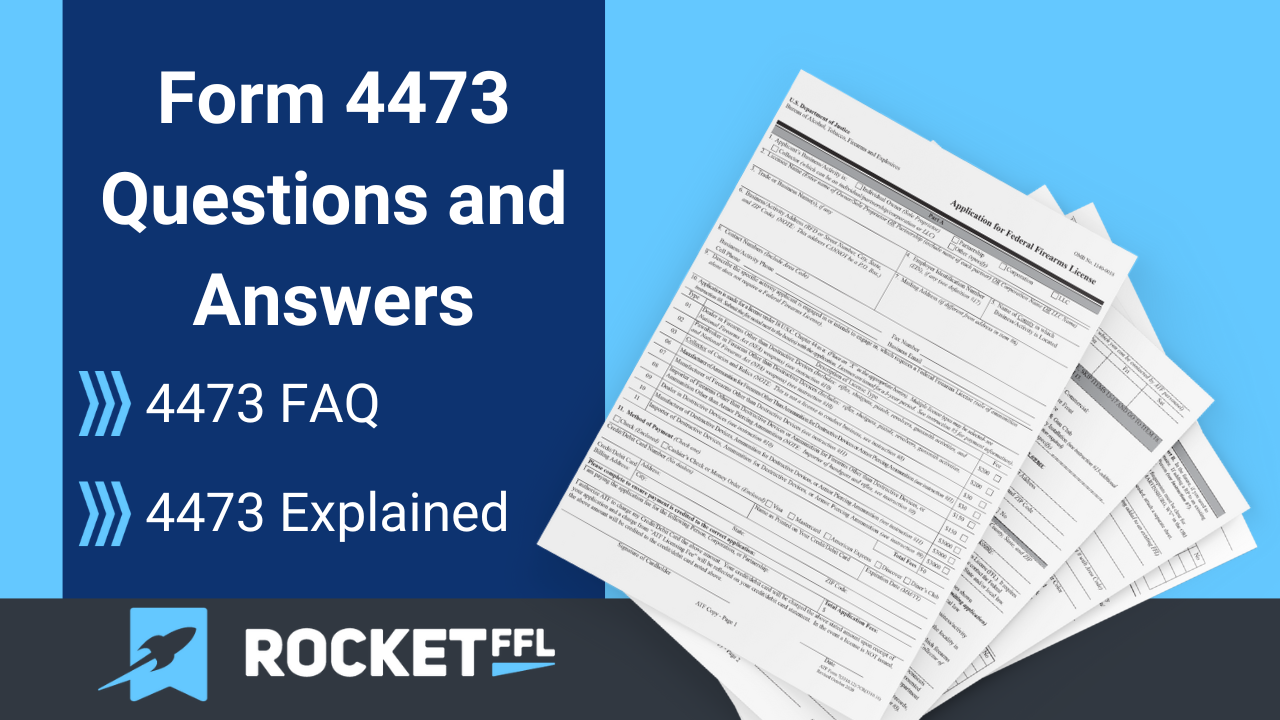
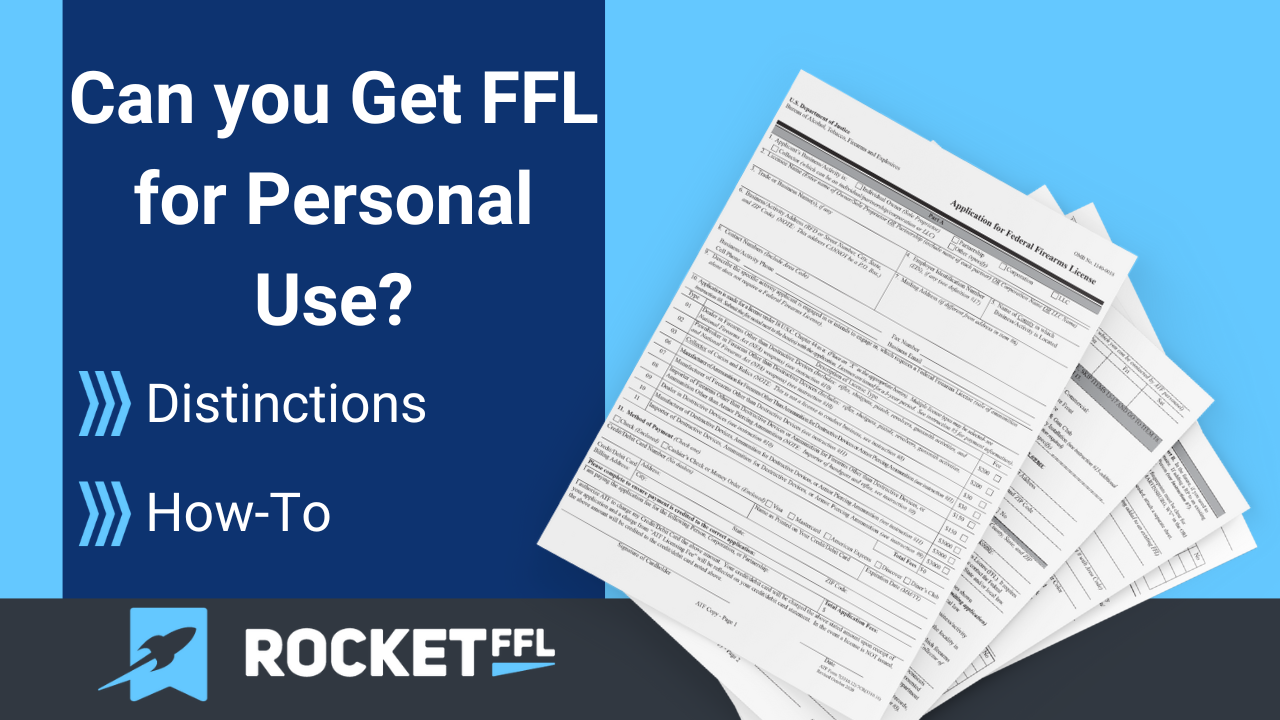
California also legalized recreation pot yesterday. How does this affect ammo sales? The Feds do not recognize legalized pot above a certain amount as previously discussed in your pod cast
Great question! Glad you’re paying attention. 🙂 If you are a user of a federally controlled substance (marijuana), then you are prohibited person and can’t possess firearms or ammunition.
Can a AZ resident legally bring ammo into CA? Any restrictions?
Sorry, I can only give federal legal advice, I can’t give legal advice in California.
I have several boxes of shot guns shell that where bought in Cal. It is now time to take a trip to Az. to dove hunt. But I dont shoot all my shells. What happens when I bring my Calif bought shell back into Calif.?
Sorry, I can only give federal legal advice, I can’t give legal advice in California.
Clyde, if you keep the receipts for the ammo showing it was legally purchased in California, and you happen to get stopped (very unlikely unless you’re driving in unsafe manner), you can prove you’re not trying to import ammo unlawfully. Keeping a few of your spent shells would be a smart thing also.
That’s the approach I take.
But if you can’t prove the purchase, you’re taking a bit of a (very small) risk, tho you shouldn’t face more serious consequence than having your remaining ammo taken by the LEO.
But if you had several HUNDRED boxes, you’ll have a bigger problem should you be pulled over!
Happy hunting! 🙂
I work for a large box store gun dealership not only do you have the restrictions you’ve mentioned all of our ammunition must be locked up the customer is not allowed to touch the ammunition and employee with a COE must hand that ammunition to another employee with a COE before the customer can pay for the customer is not allowed to touch the ammunition to after it Is purchased
So does this mean that I can sell ammunition at a garage or estate sale – as long as it is a one time face to face sale and under 500 rounds?
Sorry, you’ll have to get legal advice from an attorney licensed in California for your particular issue with California state law.